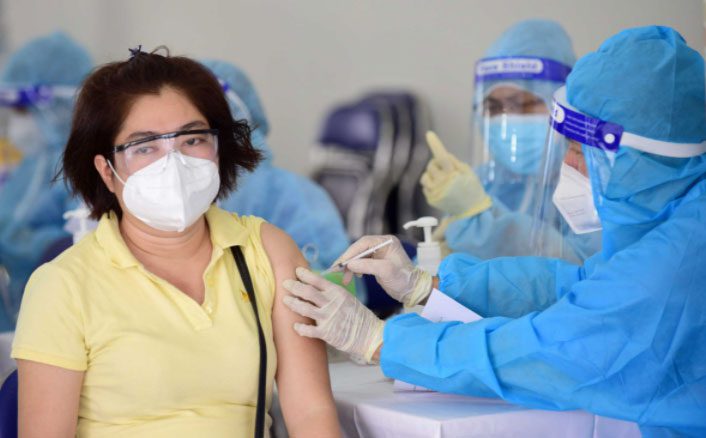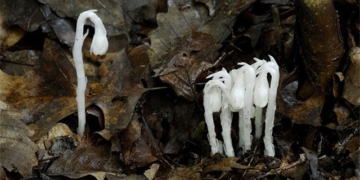Although it has been warned that lymph node reactions are rare, recently, this reaction has become more common in some individuals after receiving the third dose of the Covid-19 vaccine.
Many people experiencing lymph node reactions often feel anxious, mistakenly believing they are suffering from malignant diseases. However, according to doctors, the incidence of lymph node reactions has indeed increased after the third dose of the Covid-19 vaccine.
Shocked Thinking It Was Cancer
After receiving the third dose of the Pfizer-BioNTech vaccine on December 13, Mr. T.T. (Phu Nhuan District, Ho Chi Minh City) underwent a general health check-up two weeks later and was informed by doctors that he had many swollen lymph nodes in his body.

Vaccination for residents in Ho Chi Minh City – (Photo: D.PHAN).
Feeling confused about the cause since his health had been stable, Mr. T. underwent a biopsy and was informed that the lymph nodes were benign.
“After the ultrasound, the doctor said I might have lymphatic tuberculosis or, worse, lymphoma because my body had many swollen nodes. I was very shocked as I hadn’t noticed it before, and fortunately, the test results were safe,” Mr. T. shared.
According to Mr. T., after receiving the final results, the doctors inquired about his case and reminded him that it might be a rare side effect after receiving the Covid-19 vaccine. He noted that he had no side effects from the previous two doses, so he did not expect to experience any this time.
Sharing a similar experience, Mr. Q.K. (Binh Thanh District, Ho Chi Minh City) reported that a few days after receiving the third vaccine dose, he noticed swollen lymph nodes in his armpit, causing swelling and pain.
“I checked the information and learned that swollen lymph nodes are one of the reactions after vaccination, but since I had no issues after the first two doses, I was worried this time. My family even urged me to go to the hospital to check if there was a problem,” Mr. K. recounted.
Increased, But Not a Cause for Concern
According to the Centers for Disease Control and Prevention (CDC), the incidence of lymph node reactions after receiving the Covid-19 vaccine is about 0.3% for those receiving the Pfizer vaccine and 1.1% for those receiving the Moderna vaccine.
In Moderna’s study, 11.6% of vaccinated individuals experienced lymphadenopathy after the first dose and 16% after the second dose. Some studies indicate that mRNA-based vaccines have a higher immune response than other types of vaccines, which may explain the higher rate of lymph node reactions associated with these vaccines.
Dr. Nguyen Huy Luan, head of the vaccination unit at Ho Chi Minh City University of Medicine and Pharmacy, stated that when the immune response is triggered, the body also produces reactions, most of which are normal, and lymph node swelling is a less common reaction.
“Common reactions such as fever, headache, pain at the injection site, and fatigue usually occur a few hours after vaccination and resolve within 3 to 5 days. However, lymph node reactions tend to start later and last longer.
According to the CDC, the onset of lymph node swelling after vaccination with Moderna and Pfizer occurs within 2 to 5 days. The duration of lymph node swelling from the Pfizer-BioNTech vaccine can last up to 10 days,” Dr. Luan noted.
Dr. Nguyen Huy Luan explained that the immune response varies depending on the amount of antigen introduced into the body. Some individuals may have a strong reaction, while others may have a mild reaction, leading to different levels of antibody production for protection.
Why Do Lymph Nodes Swell?
Regarding the possibility of mixing different vaccines for the third dose, Dr. Luan added that the incidence of side effects does not increase compared to receiving the same vaccine type. However, lymph node reactions are more common after the third dose than after the first two doses.
“After receiving the first and second doses, the body has already developed an immune response and memory cells, so during the third dose, the body produces a stronger antigen-antibody response, leading to an increase in lymph node swelling,” Dr. Luan explained.
Dr. Do Cao Van Anh, deputy head of the Infectious Diseases Department at Pham Ngoc Thach University of Medicine, who also experienced lymph node reactions after the third dose, noted that the symptoms lasted more than 10 days.
“Two days after vaccination, my body started to swell lymph nodes everywhere. Although I knew it was a common acute inflammatory lymph node reaction, it caused swelling and pain when touched, which was very uncomfortable and could easily be mistaken for metastatic cancer,” Dr. Van Anh shared.
Dr. Van Anh believes this is a typical side effect that can resolve on its own without medical intervention.
“Lymph nodes usually appear in the armpit and neck on the same side as the injected arm. This condition will subside after a few days and is not dangerous, so there is no need to worry too much“, Dr. Van Anh reassured.
According to Dr. Van Anh, if an ultrasound is performed, patients should inform the doctor about the vaccination date and how many doses of the Covid-19 vaccine they have received. A recent study indicated that lymph nodes with increased metabolic activity after vaccination may reflect a robust immune response, which could be beneficial for the body.
However, individuals should still monitor if the lymph nodes become enlarged, if the skin over the swollen lymph nodes becomes red, or if there are accompanying symptoms such as prolonged fever or weight loss, in which case they should seek medical evaluation to rule out other pathologies.
Precautions During Health Checks
The occurrence of swollen lymph nodes after receiving the Covid-19 vaccine can cause confusion for many people, leading them to mistakenly think of infections or malignant diseases such as lymphatic tuberculosis or lymphoma.
Doctors recommend that imaging diagnostics or routine health checks should be conducted before vaccination or postponed for at least 4 to 6 weeks after vaccination, unless there is an urgent clinical indication.
Unnecessary biopsies should not be performed when experiencing lymph node swelling after vaccination; monitoring through ultrasound is recommended after 4 to 6 weeks.





















































